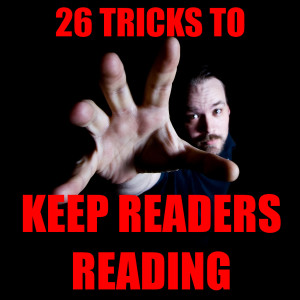In case any of you are agonizing over changes you have to make to your work in progress due to something you learned in the AIDA blog series, rest assured: I am drinking bucketfuls of my own medicine.
Title
I’ve been holding onto the same vague title for years. It sort of means something if you’ve read the book. Sort of. By itself it is unremarkable. I know I can do better.
First Chapter
- Trimmed some fat from my opening scene – including most of my main character’s physical description – to make room for actual character development, punchier dialogue, and an extra layer of depth that makes the perfect precursor to the rest of the book.
- Cut a net total of 1,304 words from that chapter.
Second Chapter
My second chapter is actually the beginning of the alternate story – one that connects to the main story but not perceptibly until much later. I offer no explanation at this point. We are simply following one character and one story in the first chapter, and an entirely different character in a different setting in the second. Mere days after realizing this egregious error, I heard one of my beta readers found it disorienting.
Why is it beta readers never seem to tell you what’s wrong with your work until after you’ve figured it out yourself?
Anyway, I added some explanatory narrative at the beginning to introduce the new story and hint at the connections without giving anything away. I also cut a few hundred words.
The Entire Middle of the Whole Bloody Book
In the midst of my quest for tips on writing a page-turner, I realized something life-changing and consequently left this sentence in my Evernote app:
ONE AT A TIME, DUH!
Translation: the order in which I introduced the five characters in the main story was all wrong. I’d made my main character the last to join the group, which meant she met all four others within paragraphs of one another, and I had to pour out oodles of backstory about who each one was and how they got there and where “there” was and what they all thought of each other and how they reacted to meeting her.
I was shooting myself in the foot with a bazooka.
So I’m both changing the order and spreading things out. She’ll spend a few days with the first person she meets, actually experiencing a couple of things I only summarized in previous drafts, and meet additional characters over the next few chapters – instead of over the next few sentences.
In short, I’ll be permanently cutting several scenes I’ve rewritten dozens of times, and adding other scenes I have never written before. I’m angry, excited, exhausted, and relieved all at the same time.
In case you missed it here’s a rundown of the whole series:
Attention
- 5 tips for grabbing attention with your book cover
- 6 types of book titles that get noticed – and picked up
Interest
Desire
- 20 tips for creating relatable – and lovable – protagonists
- The 21 best tips for writing your opening scene
Action
—
Has the AIDA blog series led you to make any painful changes to your WIP? Rant in the comments!
–








